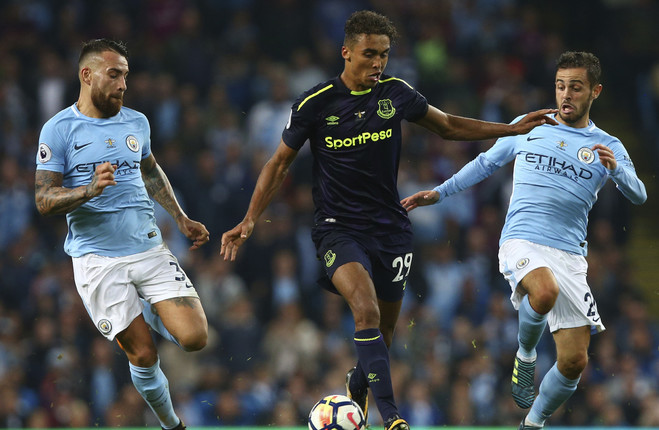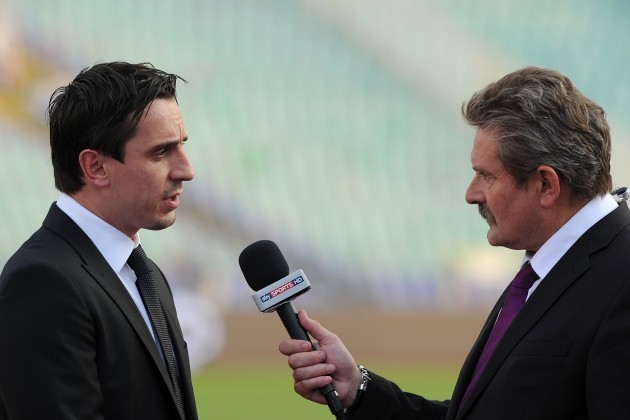FOR A LONG time in British football, the subject of players diving and play-acting was spoken about by commentators and pundits largely in harsh, disapproving terms.
Whenever they covered a Champions League match, BBC Radio 5 Live pundits would frequently speak in scathing terms about the foreign opposition and their penchant for going down easily.
When RTÉ covered European football, it was invariably a similar story.
It is still less than 10 years since Eamon Dunphy called Cristiano Ronaldo a “disgrace to football” after a Man United-Barcelona Champions League match, owing to the Portuguese star’s “petulance, temperament, throwing himself to the ground”.
Great players, Dunphy added, need to be “someone I admire”.
It is admittedly an extreme example, but many pundits’ tone regarding players who dived in the 1990s and even early 2000s to a degree was not that dissimilar across the board — to cite one high-profile example, Jurgen Klinsmann was virtually vilified in some circles for his theatrics at the 1990 and 1994 World Cups.
So initially, the issue was black and white as far as most critics were concerned — a player who dived, exaggerated contact or waved an imaginary yellow card to get an opponent in trouble had lost all credibility and respect as a footballer.
Even some players seemingly shared this view. Ian Harte memorably singled out Luis Figo for his tendency to go down easily ahead of an Ireland-Portugal 2002 World Cup qualifier. Roy Keane memorably once suggested it would be a good idea for footballers to wear anti-diving wristbands and accused then-Arsenal player Ashley Cole of play-acting.
Yet these incidents seem a long time ago now. During Monday night’s Man City-Everton clash, there was more than one incident where a player — at the very least — exaggerated contact in order to get an opponent in trouble.
The analysis of these incidents on the Sky Sports show highlighted how the issue is no longer regarded in such a straightforward manner by many players and pundits.
The reason is that diving has become so commonplace in the English game that many have begun to tolerate — if not wholeheartedly embrace — this growing trend.
Diving, of course, has always existed to a degree. However, back in the 1970s, players such as Rodney Marsh were the exception rather than the norm.
As it has become more prominent, the football media have seemed increasingly reluctant to criticise those who engage in it. Younger pundits, such as Gary Neville and Jamie Carragher, played in teams with unapologetic divers. So for these analysts to call out modern footballers for behaving similarly leaves them open to accusations of double standards.
Last night’s MNF was therefore an interesting example of the dilemma modern pundits face, and the Carragher-Neville debate provided a far more nuanced and less clear-cut analysis of the situation, in stark contrast with previous aforementioned examples.
Everton youngster Dominic Calvert-Lewin was the individual whose behaviour was scrutinised. He appeared to make the most of a Kyle Walker bump towards the end of the first half, resulting in the Man City player’s dismissal.
Carragher was more old school in his assessment of the Toffees’ 20-year-old attacker
I always did that — bumped a striker,” he said of Walker’s challenge. “(I) tried to knock them off-balance as the ball was on its way.
“He’s let himself down there, with the reaction, holding his face.”
Gary Neville then interjected: “That’s a pundit talking, it’s not you talking,” the former Man United defender said.
You, as a player, quite categorically would have wanted your striker to go down there.
“To say: ‘He’s let himself down,’ you don’t want to say that as a pundit.”
Carragher then offered the following response: “I’ve said plenty of times on this show, if a defender is stupid enough to go flying into a challenge or someone does something, you go: ‘I’ll have that, a penalty.’ I’ve got no time for someone holding their face when he hasn’t been hit in the face. Would you want that from a Man United player?”
The Liverpool legend maintained Calvert-Lewin’s behaviour was “poor” in that instance, whereas Neville defended the youngster and even suggested he might have had reason to hold his face, though acknowledged the decision to send off Walker was incorrect.
There have been many times where you played to get someone booked, I might have played to get someone booked, I feel uncomfortable sitting here as a pundit condemning people because ultimately, we were players ourselves,” Neville continued.
“Ultimately, we’re trying to gain advantages for our team whether we like it or not. We can sit here and say we were angels — we weren’t… Some people call it ‘cheating’. A lot of people don’t like it. But I can’t sit here and tell people what they want to hear. I’ll tell people what happened during our careers.
I feel uncomfortable sitting here saying that the young boy ‘should be ashamed of himself’.
He later continued: “We’ve conditioned ourselves to say: ‘If you go to ground, you’re going to be in trouble.’ The reality is, that’s where the game is going.”
Carragher also elaborated on his view, suggesting twisting the rules in certain ways was fine, but drew the line with Calvert-Lewin’s behaviour.
That is the one thing I don’t like — play acting. There is gamesmanship — getting fouls, winning fouls, putting someone under pressure to get them a yellow card, I don’t mind that.”
Prior to this season, the Premier League’s rulemakers suggested they intended to crack down on diving/play-acting. However, their powers seem limited. Subsequent confirmation that neither Calvert-Lewin nor Sergio Agüero would be punished for their ostensibly exaggerated reactions to challenges last night suggests only the most blatant offenders will be punished under these new rules.
What this issue comes down to ultimately is whether you think footballers should be great people, or ruthless pragmatists with the team’s best interests at heart.
There is a strong case to be made that Calvert-Lewin’s apparent exaggeration was the single most influential moment in last night’s match and that he, more than anyone else, was responsible for earning Everton an unlikely point away to Man City. That point could be the difference between the Toffees qualifying for the Champions League at the end of the season (an unlikely scenario admittedly!) and not. It could be the difference between Ronald Koeman keeping his job and getting sacked. It is more than likely Calvert-Lewin would consequently have been congratulated rather than condemned in the dressing room afterwards.
With that in mind, should people’s livelihoods be prioritised at the expense of playing by the rules? Or do footballers have a responsibility to act ethically on the field of play for the supposed long-term good of the game and to ensure it is viewed in a positive manner by the general public?
And where do you draw the line? Are some forms of rule-bending okay and others not, as Carragher seems to think?
There are rare exceptions, such as Paolo Di Canio’s famous refusal to put the ball in the net after a goalkeeper went down injured (see video above), but generally speaking, footballers will do more or less anything to win a match.
Like it or not, that’s the reality of modern sport, and players and pundits are increasingly accepting of this new era.
It may put plenty of ordinary viewers who want to be able to admire athletes off watching the game, but so long as Premier League profits continue to soar, football’s authorities won’t be losing much sleep over the matter.
Subscribe to The42 podcasts here:


